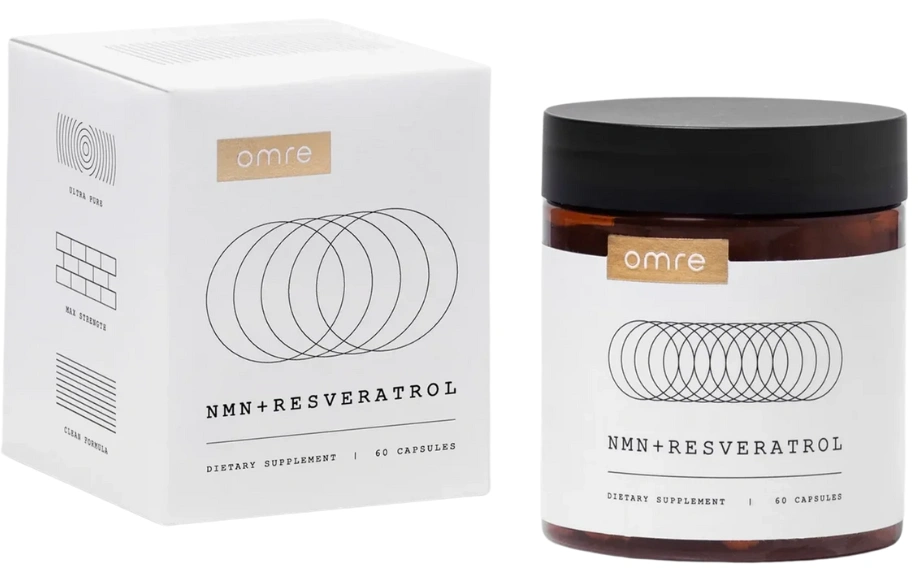Table of Contents
NMN is considered safe for most people, but like any supplement, it may come with some mild side effects for a few users. Understanding the possible risks helps you make a smarter and safer choice.
In this article, we will explain what NMN is, how safe it really is according to research, common side effects people have noticed, and tips to avoid any problems before you get started.
Cellular NAD+ booster with ultra‑pure NMN and Resveratrol, at research‑backed doses.*NMN + Resveratrol
What is NMN?
NMN, short for nicotinamide mononucleotide, is a natural compound that plays a key role in energy production and cell repair. Many people take NMN supplements to support healthy aging, boost metabolism, and improve energy levels.
Your body already makes small amounts of NMN on its own, and you can also get it from foods like broccoli, avocados, and cabbage.
However, as you age, your natural levels of NMN and NAD+ (a molecule it helps produce) start to decline. Lower NAD+ levels are linked to tiredness, slower metabolism, and signs of aging.
Studies have found that NMN supplementation may help raise NAD+ levels in the body (1).
Research on animals has shown that NMN can support better metabolism, improve muscle function, and even help protect against age-related diseases (2).
Some early human studies also suggest that NMN may offer similar benefits without causing serious side effects.
While the science is still growing, the early research looks promising and has fueled the interest in NMN as a supplement for better health and longevity.
Is NMN Safe?
Current research shows that NMN is safe and well-tolerated for most healthy adults when taken at recommended doses. Studies have not reported any serious side effects, even at higher doses up to 1200 mg per day (3).
In one small trial, participants who took 500 mg of NMN daily for ten weeks showed no harmful effects, with normal bloodwork and health markers throughout the study (4).
Other research also found that NMN improved cellular health without causing adverse reactions, supporting its strong safety profile.
NMN naturally raises NAD+ levels, a key molecule needed for energy, DNA repair, and healthy cell function.
Since NAD+ declines with age, restoring it with NMN may help support better metabolism and vitality without disrupting the body’s balance.
Although the early results are promising, experts recommend a cautious approach.
Several long-term studies are still ongoing. If you have health conditions or take medications, it is wise to check with your doctor before starting NMN.
Common NMN Side Effects
-v1745791692842.webp) Most people do not experience any serious issues with NMN. However, some users have mentioned a few mild side effects, especially when first starting out.
Most people do not experience any serious issues with NMN. However, some users have mentioned a few mild side effects, especially when first starting out.
Here are some of the common side effects people have noticed:
Digestive discomfort: Some people report mild bloating, nausea, or stomach upset, particularly during the first few days of use.
Headaches: A few users have mentioned mild headaches, which usually go away as the body adjusts.
Fatigue or dizziness: Rarely, some people feel a bit tired or dizzy, especially when beginning NMN.
Liver strain at high doses: Animal studies suggest that extremely high doses might put stress on the liver, although this has not been seen in human trials (5).
Drug interactions: If you are taking medications, especially for blood sugar or blood pressure, it is smart to talk to your doctor first.
Alertness at night: Some people find it harder to fall asleep if they take NMN too late in the day.
Rare But Possible NMN Side Effects
Rare side effects are uncommon with NMN, but a few users have reported mild reactions that you should know about.
Here are some rare side effects that have been mentioned:
Gastrointestinal issues: Some users have experienced mild diarrhea or nausea, especially when starting NMN for the first time.
Blood sugar dips: Studies suggest NMN might improve insulin sensitivity, which could slightly lower blood sugar levels (6). If you have diabetes, it is a good idea to check with your doctor first.
Allergic reactions: Though very rare, a few people have reported itching, swelling, or skin rashes after taking NMN.
Who Should Be Cautious Before Taking NMN?
NMN appears safe for most healthy adults, but certain groups should be extra careful before starting it. People with specific health conditions or those taking certain medications should always check with a healthcare professional first.
If you have diabetes, liver disease, or blood pressure concerns, NMN might affect how your body responds to medications or blood sugar control.
Pregnant and breastfeeding women are also advised to avoid NMN because there is not enough research yet to confirm it is safe during these stages.
Even if you are generally healthy, it is smart to start with a conversation with your doctor, especially if you are managing any medical conditions or taking prescription medicines.
A little extra care can help you get the best results while avoiding any unwanted surprises.
How To Minimize NMN Side Effects?
 Most side effects from NMN are mild and can often be avoided with a few simple steps.
Most side effects from NMN are mild and can often be avoided with a few simple steps.
Here are some helpful tips:
Start with a low dose: Begin with 250 mg or less to see how your body responds before increasing.
Take NMN earlier in the day: Morning use may help avoid sleep disturbances.
Choose a trusted brand: Look for NMN supplements that are third-party tested for purity and quality.
- Listen to your body: If you feel unusual symptoms like dizziness or stomach upset, pause use and check with a doctor.
Potential Health Benefits of NMN
 While side effects are possible, NMN also comes with several promising health benefits, especially when used properly.
While side effects are possible, NMN also comes with several promising health benefits, especially when used properly.
Here are some potential benefits studies have found:
May help slow down aging: Research in animal models has shown that NMN can support healthy organ function and may slow some signs of aging by replenishing NAD+ levels (7).
Might improve brain function: Studies in mice found that NMN could cross the blood-brain barrier, helping improve memory and reduce the buildup of beta-amyloid plaques linked to cognitive decline (8).
Could support reproductive health: Animal research suggests NMN supplementation may improve egg quality and ovarian health, which could help fertility in aging females (9).
Might enhance metabolic health: Studies have found that NMN can improve glucose tolerance, boost insulin sensitivity, and support better metabolic balance in both animals and humans (10).
May improve physical performance: Research indicates that NMN supplementation can reduce fatigue, strengthen muscle function, and help improve physical endurance in older adults (11).
NMN + Resveratrol
Cellular NAD+ booster with ultra‑pure NMN and Resveratrol, at research‑backed doses.*
Does NMN Increase Cancer Risk?
Current research shows that NMN does not increase the risk of cancer when taken at recommended doses. Studies have found NMN to be well-tolerated, supporting better cellular health and metabolism without any serious side effects in humans (12).
That said, like any supplement, the effects of NMN can depend on individual health conditions and dosage. While early research looks very reassuring, scientists are continuing to study NMN’s long-term safety.
If you have a history of cancer or any serious medical conditions, it is always a good idea to speak with your healthcare provider before starting NMN.
Is NMN Bad for You?
For most healthy adults, NMN is not considered bad. Research so far suggests that NMN is generally safe and may even offer important health benefits when used at proper doses.
Of course, no supplement is perfect for everyone. Some people might experience mild side effects like digestive discomfort or sleep disturbances, especially when first starting NMN.
People with existing health issues or those taking medications should also be extra cautious.
It is always smart to approach supplements like NMN with a little care.
Choosing high-quality products, following recommended doses, and checking with your doctor can help you get the most benefit with the least risk.
How to Take NMN Safely
Taking NMN safely starts with using the right dosage. Most studies have tested doses between 250 mg to 1000 mg per day (13). If you are new to NMN, it is a good idea to start with a lower dose, such as 250 mg daily, and slowly increase if needed.
Many people prefer taking NMN in the morning. Since NMN can sometimes boost alertness and energy, morning use may help avoid any trouble falling asleep at night.
Pairing NMN with a small meal that contains healthy fats can also help with better absorption.
If you are combining NMN with resveratrol, taking them together with a meal may offer even better results. Resveratrol helps activate sirtuins, which work hand-in-hand with NAD+ for healthy aging and cellular repair.
Conclusion
NMN is a promising supplement that supports healthy aging, energy production, and metabolic function.
Most research suggests it is safe for healthy adults when taken in proper doses, with only mild side effects reported by a small number of users.
As with any supplement, it is important to listen to your body, start slow, and consult a healthcare professional if you have any existing conditions.
Choosing high-quality NMN can also make a big difference in how you feel.
If you are looking for a clean and research-backed option, you can check the availability of OMRE NMN + Resveratrol, which offers ultra-pure NMN combined with resveratrol for enhanced cellular support.
FAQs
Can NMN cause headaches or nausea?
Some people have reported mild headaches or stomach discomfort when first starting NMN. These side effects are usually temporary and may go away as your body gets used to the supplement. Starting with a low dose can help reduce the chance of these issues.
What happens if I stop taking NMN?
If you stop taking NMN, your body will slowly return to its natural NAD+ levels. You will not experience withdrawal symptoms, but you might notice a small drop in energy, focus, or overall vitality over time.
Can NMN affect sleep?
Some users find that taking NMN too late in the day makes it harder to fall asleep. To avoid this, it is best to take NMN in the morning when your body is naturally more active and alert.
Is NMN safe long-term?
Early studies suggest that NMN is safe for short to medium-term use, but more long-term research is still needed. So far, no serious side effects have been reported in human trials lasting several months. For now, using NMN at recommended doses and checking in with your doctor regularly is the smartest approach.






